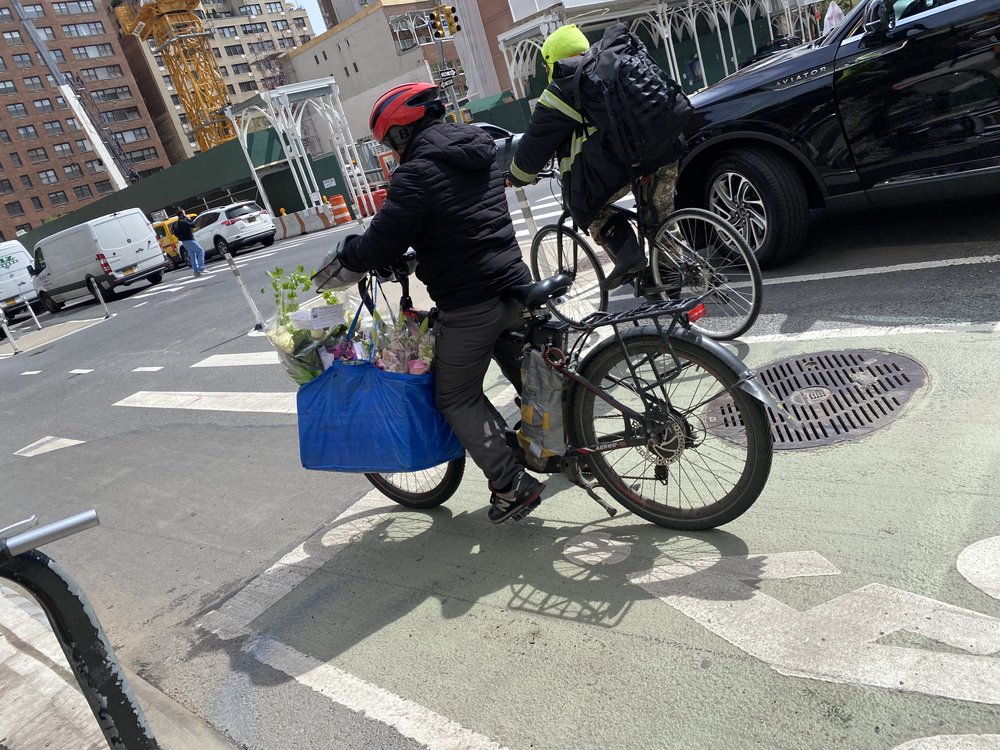Mayor Adams wants NYC to collect info on delivery workers — worrying immigrant groups
Aug. 1, 2025, 1:56 p.m.
Advocates for immigrants and delivery workers say a roster of workers on bicycles could easily become a tool for surveillance or immigration enforcement.

Advocates for immigrants and delivery workers say new rules proposed by Mayor Eric Adams’ office could end up punishing the very people they’re meant to protect by potentially exposing undocumented workers to surveillance and immigration enforcement.
The proposed rules would add an enforcement framework for decade-old regulations around workers on bicycles, which were originally put in place before the explosion of food and other delivery apps. They would fine companies like DoorDash and Uber Eats when delivery riders don’t take safety trainings, carry new identification cards or wear reflective gear with their unique driver numbers displayed.
But the rules would also expand how the city collects information. For the first time, app companies would be required to proactively submit rosters of their bike-riding workers to the city Department of Transportation. Immigrant and worker advocates worry those rosters — which include information like worker name, address and unique ID number — could be used for surveillance or immigration enforcement.
“These measures may be framed as tools for better enforcement and accountability, but they raise critical concerns,” said Ligia Guallpa, executive director of the worker advocacy group Los Deliveristas Unidos.
'Only as secure as the least reliable person'
City officials say the measures are part of a broader effort to rein in unsafe delivery practices while shifting the burden for compliance onto the platforms that employ them. The delivery companies would face fines ranging from $100 to $250 per violation for failure to comply. The Department of Transportation's new Department of Sustainable Delivery, which aims to address safety concerns around mopeds, e-bikes, cargo bikes and other new forms of transportation, would oversee compliance.
Guallpa said the ID and data-sharing requirements could expose immigrant workers to excessive surveillance and enforcement if the list is shared with the NYPD or federal authorities. She said it's a risk to even just tag workers with unique identifiers that make them more visible and traceable.
A City Hall spokesperson stressed that existing law already lets the NYPD request such data, and said the standing list would remain with the transportation department and city Department of Consumer and Worker Protection. City Hall also emphasized that under the city's sanctuary protections, local officials do not cooperate with U.S. Immigration and Customs Enforcement on civil matters like employment authorization.
The U.S. Department of Justice is currently suing to overturn those protections, which also limit when the city can cooperate with ICE on criminal matters. Adams has said he wants to scale back those protections.
“These types of data sets are only as secure as the least reliable person who has access,” said Sarah Vendzules, the nonprofit Legal Aid Society's director of immigrant justice. “It’s certainly not inconceivable that somebody could and would share this type of information.”
If authorities have someone’s name, they can find that person’s court dates, which opens immigrants up to potential detention outside of courthouses, Vendzules said.
Since April, the NYPD has issued thousands of “pink tickets” — criminal summonses — as part of Commissioner Jessica Tisch’s street safety push. There was a tenfold increase in summonses in the second quarter of this year compared to the first, when violations like running red lights or cycling without helmets typically resulted in traffic citations that didn’t require court appearances.
The spike in enforcement has been especially visible in delivery-heavy corridors like Roosevelt Avenue in Queens and Fordham Road in the Bronx. So far, there’s no evidence linking criminal cycling summonses to deportation cases, but Guallpa said she's worried about chilling effects from both the pink tickets and new registrations.
Murad Awawdeh, president of the nonprofit New York Immigration Coalition, said if the rules proceed, the city should make sure only the “absolutely necessary” personally identifying information is collected from delivery drivers. The information should also be deleted once the worker is no longer active with the company, he said.
“How do we keep as many people as safe as possible so that we’re not creating a system that can be utilized for nefarious reasons down the road?” he said.
A public hearing on the rules is scheduled for Sept. 2. Like the existing regulations, they would have companies log certain identifying information, and details about completed safety courses. The rosters aren’t required to include any information on an employee’s immigration status.
Guallpa said she understands the city is looking to crack down on safety issues caused by riders and she supports the proposed rules that would mandate safety gear and trainings. But she said collisions and close calls stem from the pressure delivery companies place on workers to move quickly and meet speed targets.
DoorDash did not respond to a request for comment. Uber senior public policy director Josh Gold said in a statement that the company objects to the new proposal, as it “singles out this 35,000 immigrant workforce for heightened surveillance and control.”
Guallpa also called for broader reforms, including e-bike charging hubs, new protected bike lanes and redesigned delivery corridors.
The City Council has yet to act on legislation proposed by the Adams administration last year that would create a licensing system for app companies and authorize penalties, including license revocation for repeated safety violations.
Grocery delivery workers are now guaranteed minimum pay under new City Council laws DoorDash workers in NYC claim ongoing wage theft despite recent settlement